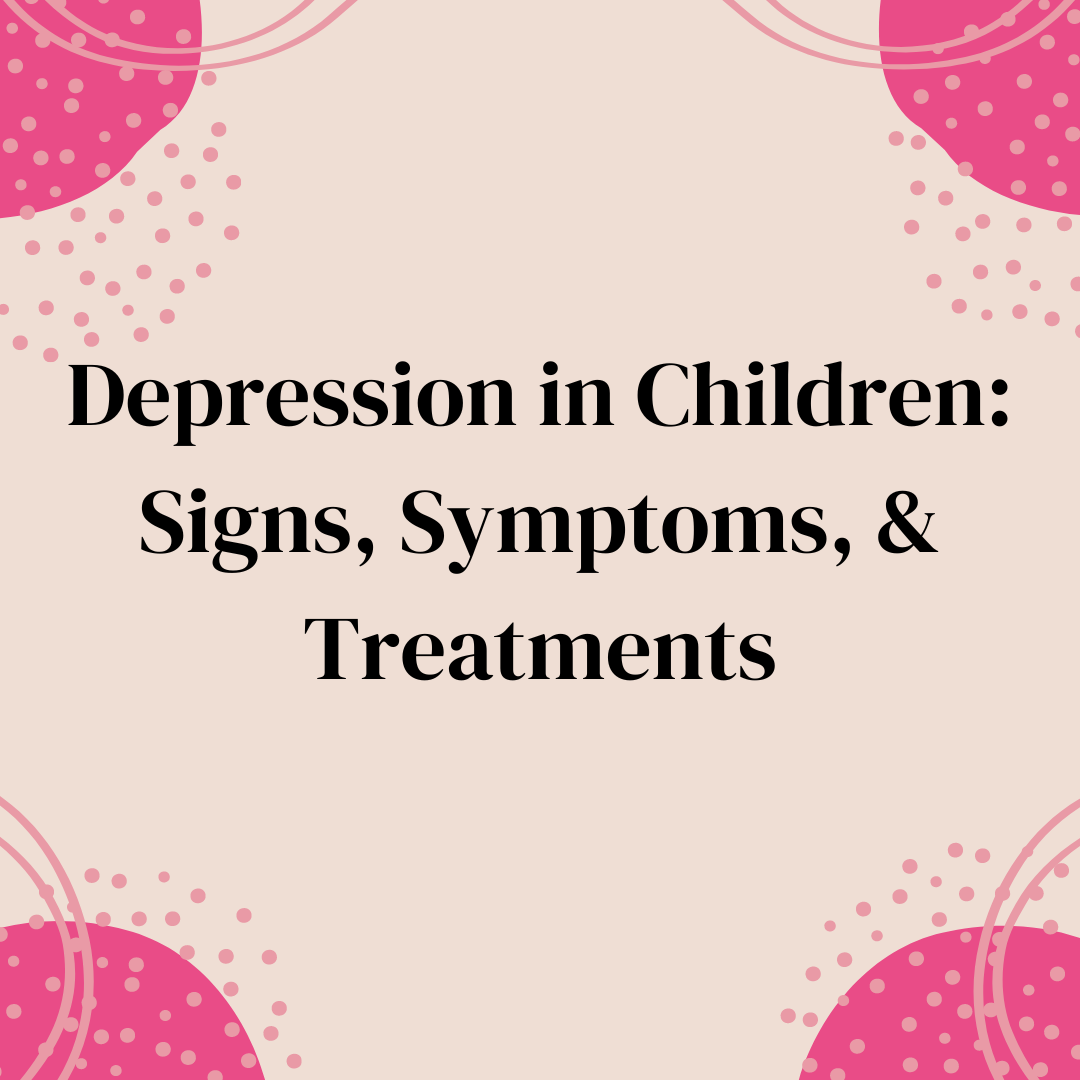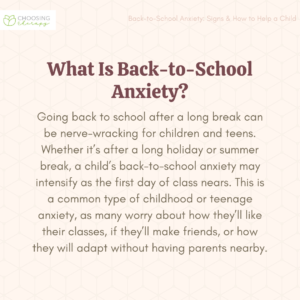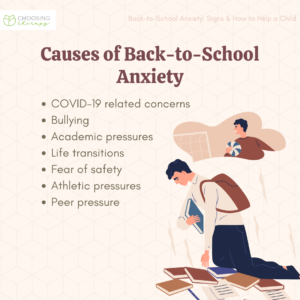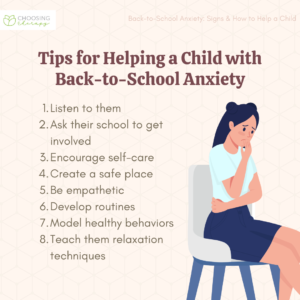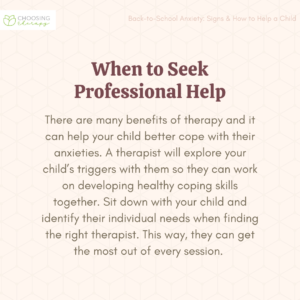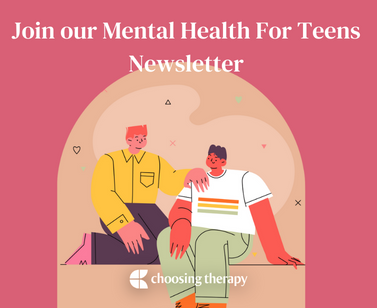
A child experiencing back-to-school anxiety will often exhibit recognizable changes in their behavior, self-care, or communication. These may include retreating frequently to their bedroom, a decline in grades, less social interaction, or changes in hygiene. Noticing these warning signs early on can help parents provide necessary support for their child.
Are you obsessively asking yourself “Am I a good parent?”
Most parents occasionally ask themselves the question. However, if you are constantly worried about being a good parent and cannot control your fears, you might have OCD. Learn More
What Is Back-to-School Anxiety?
Going back to school after a long break can be nerve-wracking for children and teens. Whether it’s after a long holiday or summer break, a child’s back-to-school anxiety may intensify as the first day of class nears. This is a common type of childhood or teenage anxiety, as many worry about how they’ll like their classes, if they’ll make friends, or how they will adapt without having parents nearby.1 While not an official type of anxiety disorder, it is important to note that back-to-school anxiety is an all too real and difficult challenge for children.
Signs of Back-to-School Anxiety
A child dealing with back-to-school anxiety will be incredibly concerned about every aspect of school–this includes engaging with peers, taking tests, meeting teachers, and other triggers. They may experience typical emotional and physical symptoms of anxiety. Caregivers and other important authority figures should remain mindful if a child begins to exhibit odd or uncharacteristic behaviors as they start the school year.
Common symptoms of back-to-school anxiety include:
- Sleep disturbances
- Loss of appetite
- Refusal to attend school
- Isolation from friends and family
- Decrease in engagement of activities
Causes of Back-to-School Anxiety
When a child is exhibiting back-to-school anxiety, loved ones should reflect on what may be causing their concerns. There are many reasons why back-to-school anxiety may develop, but children with mental health or learning disorders may be at higher risk for this type of anxiety. Other triggers include bullying, failing grades, being rejected by peer groups, and embarrassment.2
Possible causes of school anxiety include:
COVID-19 Related Concerns
The COVID-19 pandemic greatly impacted the global population, especially children who were forced to shift from a traditional school setting to online courses almost immediately. Once classes returned to normal, children once again had to readjust and “roll with the punches.” This constant not knowing what to expect year-to-year may have led to an increase in back-to-school anxiety.
As many children became accustomed to an at-home education, their ability to socialize with peers was likely affected. Additionally, young children who officially started school after the break of the pandemic may now have an innate fear of germs and the potential harm that comes from interacting with others. This might induce anxiety regarding the level of safety precautions put in place by the school system.
Bullying
Bullying is a common trigger for back-to-school anxiety. A parent, caregiver, or teacher might not even be aware that a child is being targeted by their peers. Bullying can be hard to pinpoint, but can greatly impact a person in numerous ways.
In today’s technology-heavy society, cyberbullying is also a major concern. On top of this, social media can be used as a tool by bullies to attack a child. Regardless, if a child is being bullied, they may be especially fearful of returning to school if they know they will have to interact with or be in close proximity with bullies.
Academic Pressures
A child may feel academic pressure from their family members, teachers at school, or even friends. In most situations, parents and caregivers encourage their child to maintain good grades and stay on top of assignments. However, when this becomes excessive or demanding, it can make a child worry about how they will meet expectations once the school year starts. Or, a child may be concerned about not being able to keep up with peers. Either way, a child may begin trying to avoid going to school, completing homework, or discussing their education at all.
Life Transitions
Childhood and adolescence is marked by big life changes such as puberty, new friendships, and increased self-awareness. A child who is going through life transitions, especially puberty, might not know how to adapt or cope with the associated uncertainty. Because of this, they may be embarrassed or worried about attending school if they think their peers are not experiencing similar situations.
Fear of Safety
Back-to-school anxiety may be caused by a child’s fear of going to school in general. This can stem from a variety of stressors, such as spread of disease or school shootings. Seeing news stories covering such horrific and traumatizing events can result in children wondering what they would do if these occurred at their school.
Athletic Pressures
Most of the time, children can benefit greatly from engaging in extracurricular activities. However, being expected to excel in sports can be a major stressor for children. Athletic pressures might also be combined with educational pressures, which can be an overwhelming burden for a child. Therefore, as the start of the school year approaches, a child may become increasingly anxious as they consider the best approach to managing these expectations.
Peer Pressure
Children often experience peer pressure at school. When their friends are influencing them to do things they are uncomfortable with, children may become worried about how they’ll deal with these pressures. They may ultimately react by withdrawing, experiencing panic attacks, or avoiding school as much as possible.
Help Your Children Develop & Be Happy
Online Therapy & Coaching (ages 1 -17) Bend Health is a virtual mental healthcare provider caring for kids, teens, and their families. Many insurance plans are accepted. Learn More
Charlie Health – Does your teen need additional mental health support? Charlie Health creates personalized treatment plans for young people (ages 11+) that include individual therapy, family therapy & curated peer groups. 92% of parents & caregivers would recommend Charlie Health to a friend or family member. Insurance accepted. Learn More
Thriveworks – In-person or Online Therapy – Therapy can change your child’s life. Connect with a licensed therapist online or in-person, and cover most of the cost with your insurance. Click here to Find A Therapist or call (877) 314-3813
8 Tips for Helping a Child With Back-to-School Anxiety
There are many challenges a child with back-to-school anxiety might face. Therefore, it’s important for parents and caregivers to provide support. They can start by modeling healthy coping mechanisms so their child can better manage their worries and emotions as they occur.3
Below are eight tips for helping a child with back-to-school anxiety:
1. Listen to Them
When your child is being open and honest with you, listen to them. Children who come to you for love, attention, and guidance are allowing themselves to be vulnerable with you. Knowing that they have your support can help them feel at ease and calm. It is important for a child to have a safe space and someone to turn to. By actively listening to your child, you are validating their feelings and experiences.
2. Ask Their School to Get Involved
A parent or caregiver should always provide support for their child. However, it can also be helpful to ask other important authority figures at school to get involved. Consider reaching out to your child’s guidance counselor or favorite teacher to fill you in on any challenges your child may be encountering at school. By having a collaborative approach, you can gain insight into how you can best support your child.
3. Encourage Self-Care
Everyone benefits from self-care, but sometimes children are not aware of healthy self-care practices or activities. A child who maintains healthy self-care routines will remember to check-in with themselves when they are experiencing an overwhelm of anxiety. This can help them determine what exactly is triggering their worry. Additionally, teaching your child self-care reminds them that they are valuable and worthy of rejuvenation, peace, and balance.
4. Create a Safe Place
A child with back-to-school anxiety needs a safe place to escape during times of distress. Create a neutral, calm environment at home where your child can retreat to when they feel overwhelmed. Try setting aside a certain room or corner in your house that includes relaxing activities for your child to engage in. For example, journaling can help them release and deal with mental clutter in a tangible way.
5. Be Empathetic
It can be distressing for parents to witness their child experiencing back-to-school anxiety. Even if you are struggling to cope yourself, it is essential to remain empathic and caring when your child comes to you for support. Take time to tell them that it’s okay to feel anxious and scared. Let them know that no matter what, they should feel safe sharing their true feelings with you. By remaining sensitive to your child’s needs, they may feel more at ease about their stressors and triggers.
Online Psychiatry and Medication Management Covered By Insurance Talkiatry provides online care from real psychiatrists who specialize in treating children and adolescents. Take our short assessment to see if Talkiatry is right for your child.
6. Develop Routines
Ever notice that following a routine can help you feel less stressed about the day ahead? This is true for children, too! When a child has a schedule they can rely on, they have one less thing to worry about (like going back to school). Try writing a physical run-down of daily activities on a calendar or white board.
Additionally, make it a point to set a time each day, week, or month to talk about what is and isn’t going well in your child’s life and at school. It doesn’t have to be formal–maybe just a chat around the dinner table or while watching a movie. Incorporating this into your child’s routine will remind them that you care about their mental health and that their feelings matter.
7. Model Healthy Behaviors
Be a role model for your child so they know how to set healthy boundaries and behave in ways that empower them. For example, prioritize self-care, have mental check-ins, and make an effort to validate your own emotions. By modeling these behaviors, your child will learn that these actions are important and they should practice them, too. In turn, they may be better equipped to handle their negative feelings and worries about going back to school.
8. Teach Them Relaxation Techniques
Teaching your child relaxation techniques allows them to deal with anxiety as it occurs, no matter where they are. Try showing them how to practice breathwork so they can stay grounded when they are feeling overwhelmed.
When to Seek Professional Help
There are many benefits of therapy and it can help your child better cope with their anxieties. A therapist will explore your child’s triggers with them so they can work on developing healthy coping skills together. Sit down with your child and identify their individual needs when finding the right therapist. This way, they can get the most out of every session.
Therapy options for back-to-school anxiety include:
- Cognitive behavioral therapy (CBT): CBT for kids focuses on teaching your child how their anxious thoughts affect their actions. When dealing with back-to-school anxiety, this can help your child recognize when their fears are impacting their performance, interaction with peers, or attitude. They can then focus on changing their mindset.
- Family therapy: When caregivers and children work together in family therapy, they are able to share their feelings openly, develop coping skills, and learn how to support one another.
- Play therapy: Play therapy allows a child to express their emotions through play and fun toys. This can help your child relax and feel more comfortable about sharing their feelings with their therapist (and hopefully with you!).
- Dialectical behavioral therapy (DBT): DBT for kids and DBT for teens incorporates mindfulness skills that will help your child stay grounded, calm, and relaxed during times of emotional distress.
Final Thoughts
Back-to-school anxiety is more than just worry about coursework and peer pressure–it can impact every aspect of a child’s school-life. Addressing your child’s symptoms as soon as possible is important. By providing them with ample support, you are helping them better navigate and manage their fears in healthy ways.
Additional Resources
To help our readers take the next step in their mental health journey, Choosing Therapy has partnered with leaders in mental health and wellness. Choosing Therapy is compensated for marketing by the companies included below.
Online Therapy & Coaching (ages 1 -17)
Bend Health is a virtual mental healthcare provider caring for kids, teens, and their families. Many insurance plans are accepted. Learn More
Virtual Therapy For Teens
Charlie Health creates personalized treatment plans for young people (ages 11+) that include individual therapy, family therapy & curated peer groups. 92% of parents & caregivers would recommend Charlie Health to a friend or family member. Insurance accepted. Learn More
In-person Or Online Therapy For Children & Teens
Thriveworks – Therapy can change your child’s life. Connect with a licensed therapist online or in-person, and cover most of the cost with your insurance. Click here to Find A Therapist or call (877) 314-3813
Online Therapy
TeenCounseling (ages 13 -19) – Help your child thrive with professional counseling. Get matched with a licensed therapist who specializes in teens. Discuss your child’s issues and situation. When you approve, the therapist is connected with your child. The therapist interacts with your child over text, phone, and video. Starting for as little as $65 per week. Get Started
OCD and Children
NOCD – What are the signs of OCD in children? OCD involves unwanted intrusive thoughts, images, or urges (obsessions) that create anxiety, which the child attempts to relieve by performing rituals (compulsions). These rituals can be overt and noticeable (e.g. handwashing, counting, avoiding objects, rearranging materials, etc.) or can be less noticeable or mental (e.g. silently analyzing, reiterating phrases, counting, etc.). To find out if your child has OCD and treatment options, schedule a free 15 minute call with NOCD.
How to Find & Choose the Right Therapist for Your Child Discovering and selecting the right therapist for your child often comes down to two things: research and persistence. Be willing to put in the time and effort to call around to different therapists or therapy organizations in your area. Read through therapist profiles to see if their style, approach, and expertise resonate with you and your child.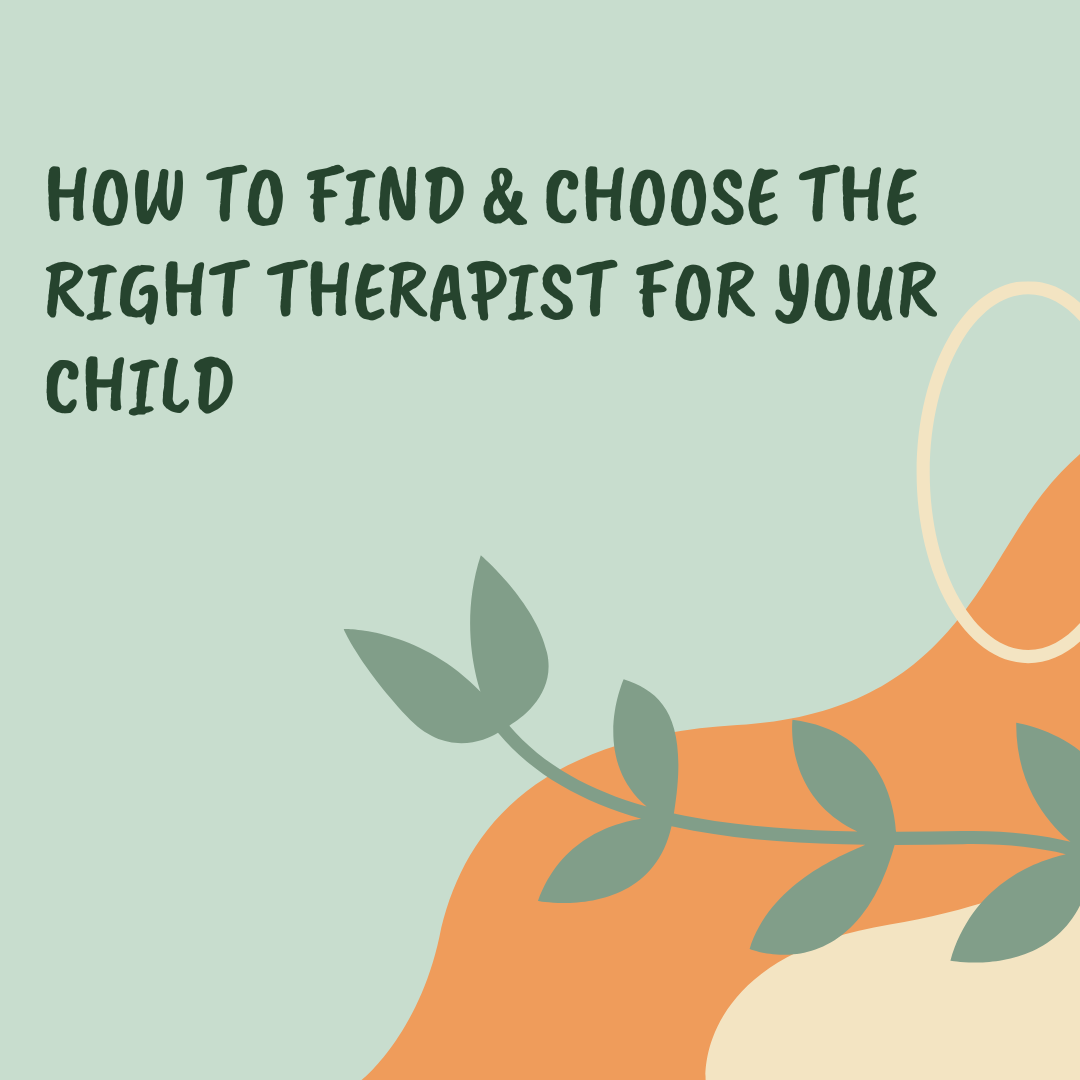
Depression in Children: Signs, Symptoms, & Treatments If you or someone you know is concerned about symptoms related to depression, seeking professional help from a mental health provider is highly recommended. Licensed professional counselors, social workers, psychologists, or psychiatric medication prescribers are able to determine whether a person is experiencing depression and the best methods of treatment.